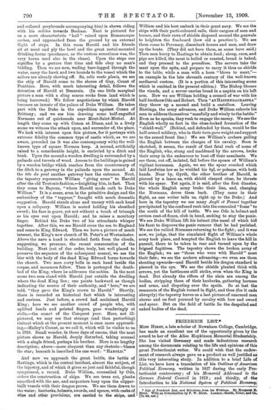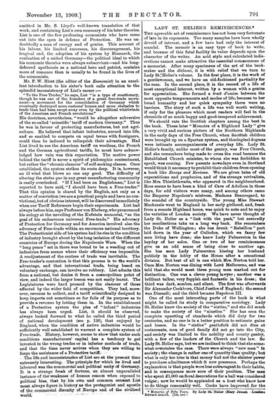FRIEDRICH LIST.*
Miss HIEST, a late *choler of Newnham College, Cambridge, has made an excellent use of the opportunity given by the award to her of the Alice Hopkinson Memorial Studentship. She has visited Germany and made industrious research among the documents relating to the life and opinions of this great Protectionist writer. We could wish that the endtriv.‘ ment of research always gave us a product as well justified se this very interesting study. In addition. to, a brief Life of List, we have here a translation of his Outlines of American Political Economy, written in 1827 during the early Pro-. tectionist controversy ; of his Memorial Addressed to the German Federal Ooiniil in 1819 ; and thirdly, of , Introduction to hie ,National System of Political Economy; * Lys Priedrioh List, .and Selections from Ms Writiips. Ri_ xarit. With an Introduction by F. W. Hirst. London s ElZSZtOis. net.1 ' • •
omitted in Mr. S. Lloyd's well-known translation of that work, and containing List's own summary of his later theories.
List is one of the few professing economists who have come out into the open in defence of Protection. He was un- doubtedly a man of energy and of genius. This account of his labour, his limited successes, his discouragement, his tragical end, the adoption of his system by Bismarck, the realisation of a united Germany—the political ideal to which his economic theories were always subservient—and his long- deferred apotheosis as a national hero and patriot, contains more of romance than is usually to be found in the lives of the economists.
Mr. F. W. Hirst (the editor of the Economist) in an excel-
lent introduction to his sister's book calls attention to the splendid inconsistency of List's career :—
" To the Free Trader," he says, List "is a type of reactionary, though he was one of the founders of a great free-trade move- ment—a movement for the consolidation of Germany which eventually destroyed more customs' houses and more obstacles to trade than had been swept away even by the political whirlwinds of the American and French revolutions."
His doctrines, nevertheless, "would be altogether subversive of the so-called scientific' tariff of modern Germany." Thus he was in favour of protecting manufactures, but not agri- culture. He believed that infant industries, nursed into life, and so enabled to compete on equal terms with foreigners, could then be induced to relinquish their advantage. Had List lived to see the American tariff on woollens, the French and the German agricultural tariffs, he must have acknow- ledged how vain was this expectation. The motive power behind the tariff is never a spirit of philosophic contentment,
but rather the " chronic clamour" of self-seeking classes. Once established, the system strikes its roots deep. It is, however, an ill wind that blows no one any good. The difficulty of altering the status quo in any great manufacturing community is easily overlooked. " If I had been an Englishman," List is
reported to have said, "I should have been a Free-trader." That this opinion is shared by the English, not only as a matter of conviction (we are a practical people and have no con- victions), but of obvious interest, will be discovered immediately when our Tariff Reformers begin their experiments. List had always before him, says Professor von Eheberg, who pronounced his eulogy at the unveiling of the Kufatein memorial, "as the goal of his endeavours universal Free-trade." His advocacy of Protection for Germany and for America involved also the advocacy of Free-trade within an enormous national territory. The Protectionist side of his system had its rise in the condition of industry brought about by the long isolation of the different countries of Europe during the Napoleonic Wars. When the " long peace " set in there was bound to be a weeding out of industries from scenes where their efficiency was impossible. A readjustment of the centres of trade was inevitable. The Free-trader's contention is that this process is to the world's advantage, and that international trade, being based on voluntary exchange, can involve no robbery. List admits this
from a national, but denies it from a cosmopolitan point of view, and indeed the larger lesson was not easily learnt. The Legislatures were hard pressed by the clamour of those affected by the wider field of competition. They had, more- over, revenue to collect, and a tariff scientifically designed to
keep imports out sometimes so far fails of its purpose as to provide a revenue by letting them in. In the establishment of a Protective system the plea of " infant " industries has always been urged. List, it should be observed, always looked forward to what he called the third period of national development (see p. 126), that enjoyed by England, when the condition of native industries would be sufficiently well established to warrant a complete system of Free-trade. History, however, seems to show that under such conditions manufacturers' capital has a tendency to get invested in the wrong trades or it inferior methods of trade,
and that the time never arrives when they are willing to forgo the assistance of a Protective tariff. •
. The life and inconsistencies of List are at the present time
extremely interesting. The prinoiple for which he lived and laboured was the commercial and political unity of Germany. It is a strange freak of fortune, an almost unparalleled
instance of the weakness of -human reason when exposed to political bias, that by his own and common consent List must always figure in history as the protagonist and apostle of the commercial disunity of Europe and of the civilised world.















































 Previous page
Previous page